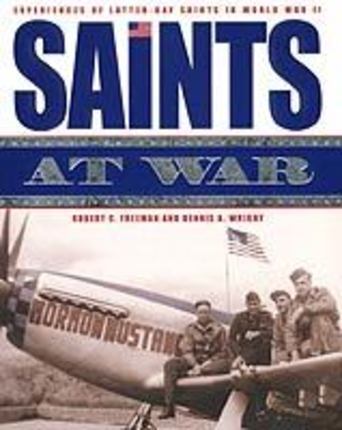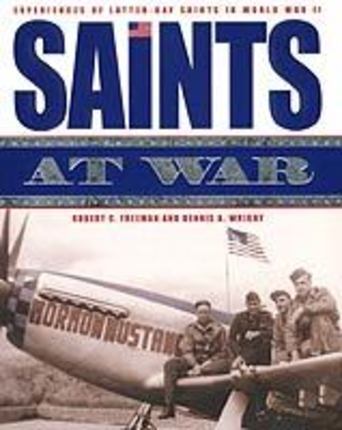"And in that day shall be heard wars and rumors of wars, and the whole earth shall be in commotion" (D&C 45:26).
As Latter-day Saints, we know this scripture to be true as wars and conflicts have spread throughout the earth. But how should we as members feel about war?
As the Church's article on war from lds.org points out, we are a people of peace, "However, we recognize that in this world, government leaders sometimes send military troops to war to defend their nations and ideals."
Mormon prophets have had much to say about the morality of war, how members should act during wartime, and what happens to those who die in combat.
Russell M. Nelson
While an apostle, President Russell M. Nelson spoke about peace and war in his October 2002 general conference address "Blessed Are the Peace Makers."
In his address, President Nelson points out that we are taught in D&C 98:16 to "renounce war and proclaim peace" and "love thy neighbor as thyself" (Matt 22:39). However, President Nelson also shares that individual members of the Chruch may be called to participate in military service.
"Because 'we believe in being subject to kings, presidents, rulers, and magistrates, in obeying, honoring, and sustaining the law,' members of this Church will be called into military service of many nations. 'We believe that governments were instituted of God for the benefit of man; and that he holds men accountable for their acts in relation to them, both in making laws and administering them, for the good and safety of society.'"
Touching on the morality of participating in warfare when we are to "proclaim peace," President Nelson also shares there are multiple examples in the scriptures of members of the gospel participating in wars and battles, including ancient Nephite prophets. It is from their example that we can see circumstances in which members may be called upon to go to war.
"If Latter-day Saints are called upon to go into battle, they can look to the example of Captain Moroni, the great military leader in the Book of Mormon. Although he was a mighty warrior, he 'did not delight in bloodshed' (Alma 48:11). He was 'firm in the faith of Christ,' and his only reason for fighting was to 'defend his people, his rights, and his country, and his religion' (Alma 48:13). If Latter-day Saints must go to war, they should go in a spirit of truth and righteousness, with a desire to do good. They should go with love in their hearts for all God’s children, including those on the opposing side. Then, if they are required to shed another’s blood, their action will not be counted as a sin" ("War,"lds.org).
► You'll also like: 10 Prophets and Apostles Who've Served in the Military (+ Their Incredible Stories)
And though war and acts of terrorism have raged on the earth since the days of Cain, President Nelson shares in his message that peace and peaceful living is still possible through the gospel.
"Isaiah prophesied of hope for our day. Speaking of the gathering of Israel and the Restoration of the Church through the Prophet Joseph Smith, Isaiah wrote:
"'It shall come to pass in that day, that the Lord shall set his hand again the second time to recover the remnant of his people, . . .
"'And he shall set up an ensign for the nations, and shall assemble the outcasts of Israel, and gather together the dispersed of Judah from the four corners of the earth.'
"These prophecies of hope could materialize if leaders and citizens of nations would apply the teachings of Jesus Christ. Ours could then be an age of unparalleled peace and progress."
Although we as members should not seek for war or delight in warfare, we are taught that participating in combat is sometimes necessary, as it was with Captain Moroni, to defend our families and freedoms and is not counted as a sin.
Gordon B. Hinckley
Less than a month after the deadly terrorist attacks on September 11, 2001, President Gordon B. Hinckley stood at the pulpit in general conference just as missile attacks were underway in Afghanistan. Speaking to a worldwide audience acutely aware of these acts of war and conflict throughout the world, President Hinckley illustrated the way for members to press forward during wartime in his talk "The Times in Which We Live."
"Now, brothers and sisters, we must do our duty, whatever that duty might be. Peace may be denied for a season. Some of our liberties may be curtailed. We may be inconvenienced. We may even be called on to suffer in one way or another. But God our Eternal Father will watch over this nation and all of the civilized world who look to Him. He has declared, 'Blessed is the nation whose God is the Lord' (Ps. 33:12). Our safety lies in repentance. Our strength comes of obedience to the commandments of God.
"Let us be prayerful. Let us pray for righteousness. Let us pray for the forces of good. Let us reach out to help men and women of goodwill, whatever their religious persuasion and wherever they live. Let us stand firm against evil, both at home and abroad. Let us live worthy of the blessings of heaven, reforming our lives where necessary and looking to Him, the Father of us all. He has said, 'Be still, and know that I am God' (Ps. 46:10)."
In addition to cautioning members to be frugal, build food storage, and get out of debt, President Hinckley also made it clear that members should not persecute those who are innocent simply because they belong to the same religion and ethnicity of those who commit acts of violence.
"This is not a matter of Christian against Muslim. I am pleased that food is being dropped to the hungry people of a targeted nation. We value our Muslim neighbors across the world and hope that those who live by the tenets of their faith will not suffer. I ask particularly that our own people do not become a party in any way to the persecution of the innocent. Rather, let us be friendly and helpful, protective and supportive. It is the terrorist organizations that must be ferreted out and brought down."
President Hinckley reiterated this in his 2003 general conference talk "War and Peace."
"First, let it be understood that we have no quarrel with the Muslim people or with those of any other faith. We recognize and teach that all the people of the earth are of the family of God. And as He is our Father, so are we brothers and sisters with family obligations one to another."
From President Gordon B. Hinckley, we see how members should act during times of war and conflict by turning to the Lord, living a frugal life, and never persecuting people who are of a different nationality, ethnicity, or religion.
Harold B. Lee
As a prophet during the close of the Vietnam War, President Harold B. Lee saw the effect of war on members, including the unspeakable loss of loved ones in combat.
While speaking at a memorial service in 1971 for Latter-day Saints who had lost their lives in the Vietnam War, President Lee offered messages of hope to those experiencing incredible loss.
"Another question often asked is, 'Why was not my son or brother or husband or fiancé protected on the fields of battle as were others who testify that they were miraculously spared?' People who have lost their loved ones are ofttimes troubled by faith-promoting incidents of those who have been miraculously spared. They may say, 'Why did it have to happen to my boy (or my husband or my brother or my fiancé)?'
"While this question may never be fully answered in this life, we are given some illuminating observations from sacred writings. . . .
"In the Book of Mormon record, we have the words of the prophet Moroni, mistakenly reproving Pahoran for his seeming negligence while his enemies were murdering thousands of his brethren. Moroni wrote to Pahoran:
"'Do ye suppose that, because so many of your brethren have been killed it is because of their wickedness? I say unto you, if ye have supposed this ye have supposed in vain; for I say unto you, there are many who have fallen by the sword; and behold it is to your condemnation;
"'For the Lord suffereth the righteous to be slain that his justice and judgment may come upon the wicked; therefore ye need not suppose that the righteous are lost because they are slain; but behold, they do enter into the rest of the Lord their God' (Alma 60:12–13).
"The sin, as Moroni of old has said, is upon those who sit in their places of power and 'in a state of thoughtless stupor' (Alma 60:7), in a frenzy of hate, who lust for unrighteous power and dominion over their fellowmen, and who have put into motion eternal forces that they do not comprehend or cannot control. God in his own due time will pass sentence upon such leaders."
Though we may not know exactly why some loved ones are miraculously spared while others die in combat, we do know that "eternal forces" will cause the perpetrators of war to "perish by the destructive forces that they have unloosed," according to President Lee.
And although it may seem like the promises given to these Saints, especially in patriarchal blessings, are now void, President Lee shares how blessings can still be accessed in the life to come. Quoting a patriarch at a funeral of a returned missionary, President Lee said:
"When a patriarch pronounces an inspired blessing, such a blessing encompasses the whole of life, not just this phase we call mortality.'
"'If in this life only we have hope in Christ, we are of all men most miserable,' said the apostle Paul. If we fail to understand this great truth, we will be miserable in time of need, and then sometimes our faith may be challenged. But if we have a faith that looks beyond the grave and trusts in divine providence to bring all things in their proper perspective in due time, then we have hope, and our fears are calmed."
From President Lee, we learn that we don't know why some are spared on the battlefield while others are not, but the promises made to them through their patriarchal blessings will carry on into the eternities to come.
WWII Statement
During the worldwide conflict that was WWII, the First Presidency (which consisted of Heber J. Grant and his counselors J. Reuben Clark and David O. McKay) released a statement on war.
Quoted by future prophets, the statement clarified the Church's position on war and the soldiers who participate in combat.
“The Church is and must be against war. . . . It cannot regard war as a righteous means of settling international disputes; these should and could be settled—the nations agreeing—by peaceful negotiations and adjustments," the statement reads. "The Church itself cannot wage war, unless and until the Lord shall issue new commands. . . . But the Church membership are citizens or subjects of sovereignties over which the Church has no control.”
Asserting that the Church is against war, keeping in harmony with the teaching from D&C 98:16, President Lee nonetheless acknowledges that the members are subjects of sovereignties. This also keeps in harmony with the 12th Article of Faith: "We believe in being subject to kings, presidents, rulers, and magistrates, in obeying, honoring, and sustaining the law" (Articles of Faith 1:12).
The statement also says that Saints called "into the armed service of any country to which they owe allegiance, their highest civic duty requires that they meet that call. If, harkening to that call and obeying those in command over them, they shall take the lives of those who fight against them, that will not make of them murderers. . . . For it would be a cruel God that would punish His children as moral sinners for acts done by them as the innocent instrumentalities of a sovereign whom He had told them to obey and whose will they were powerless to resist.”
► You'll also like: The Church's Statement on War During WWII: A Promise for Righteous Soldiers
While we as members should seek peace, there may be times when we are called upon to participate in warfare, and it is their "highest civic duty" to meet that call.
Lead image from Getty Images

Saints at War brings together more than 200 remarkable stories — from Church leaders and veterans around the world — with hundreds of images that capture the essence of faith in the midst of war. Included are accounts by Thomas S. Monson, James E. Faust, Boyd K. Packer, David B. Haight, and Neal A. Maxwell.



